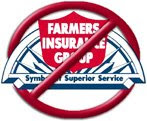It happens like clockwork.
Lately, it seems like every winter a storm blasts through Washington state bringing with it rain, wind and property damage.
If your roof gets swept up in hurricane-force winds, if a tree falls on your garage, are you covered by insurance?
Sometimes homeowners think they’re fully covered for things such as roofs, when they’re only really covered on the depreciated value of the roof, a decade after it was put on. Those can be hard, frustrating lessons, and sometimes, when an argument between homeowners and insurance companies gets heated, the state becomes involved.
In the last few years, countless people on the Twin Harbors have received a crash course in homeowners insurance coverage. Experiences have varied widely, but many have been frustrated by it.
The Daily World recently analyzed complaints filed with the state Insurance Commissioner’s Office resulting from a December 2006 storm and the big December 2007 storm.
A complaint registered with the Insurance Commissioner doesn’t mean an insurance company has done anything wrong, said Eric Mark, the public records manager for the state office. In fact, according to state investigator records obtained by The Daily World, most times insurance companies have not broken any regulatory rules at all.
But while many times rules may not have been broken, some policy holders feel so frustrated they still contact the Insurance Commissioner.
By the numbers
Statewide,
Farmers Insurance had the most complaints lodged against it during the storm season, tying Allstate Insurance after the December 2006 storm with 11 complaints and garnering another 11 complaints from the December 2007 storm, for a total of 22.
Allstate had a total of 15 complaints from both storms. Farmers-owned Foremost Insurance had the third-most complaints filed, receiving 10 complaints from both storms.
Farmers’ top status for complaints received by the Insurance Commissioner is actually on par with the complaints the company gets year-round. For homeowner policies in 2007, Washington residents filed 101 complaints against Farmers, which had about a 13 percent market share of the state, the state agency says. In 2006, there were 72 complaints filed against Farmers. In both years, no other insurance company garnered as many complaints.That compares, for instance, with State Farm Insurance, which had 55 complaints in 2007 and nearly 20 percent of the state’s market share — the highest share of any company. It registered only 43 complaints in 2006. During the past two December storms, just four complaints were filed against State Farm.
A spokesman for Farmers did not return phone calls seeking comment.
It was Farmers that took the Insurance Commissioner’s Office to Thurston County Superior Court in November over a couple of the case files The Daily World sought to review in a public records request for this story. Farmers initially didn’t want the state to release any of the information contained in two of the files, citing “trademark” protections. But during the court hearings, the company eventually changed its point of view and with a judge’s blessing released redacted information.Mark, the public records manager for the Insurance Commissioner’s Office, says it’s been a couple of years since an insurance company has contested a public records request in court.
Some complaints
Complaints range from frustrated homeowners to cases that may be bound for court.
Sharon Longwith — one of the few people who allowed The Daily World to print her name for this story — said she thought she had a rock-solid policy that would have covered her house in all kinds of situations.
But she told The Daily World that Farmers partially denied a claim she and her husband filed with the insurance company following the December 2007 storm.The storm had soaked the south side of her home, but she says the company wouldn’t pay for all of the damage “because the storm didn’t put a hole in my wall.”
That’s why she filed a complaint with the insurance commissioner’s office. When that didn’t help, she turned to FEMA for help. And when FEMA turned her down, she was able to find some financial assistance through the U.S. Department of Agriculture’s rural development program.
“Without the U.S. Department of Agriculture, I think we’d still have damage today,” Longwith said last month. “They gave us the money to hire a contractor, to repair the damage and are truly unsung heroes. I don’t think many people know they can get help through them.”
But some folks aren’t as lucky as Longwith.
A Rochester couple filed a complaint against Farmers following the December 2007 storm because the water around their home had risen to such a level that they actually had to be evacuated. The couple is named in the state documents but asked The Daily World not to identify them.In their initial complaint letter to Insurance Commissioner Mike Kreidler, they wrote, “The flood water destroyed our insulation and heating ductwork completely, the skirting is waterlogged and will also need to be replaced. Our home has a cold-dampness inside and we have been using space heaters 24/7 to keep the cold/damp air at bay. This has resulted in a high electric bill; $191.00 for December. You can see the water in the floor ducts throughout the house.”
Their complaint wasn’t that Farmers wouldn’t cover their damage, but that the company was taking too long to respond. In the end, according to the Insurance Commissioner’s Office, the homeowners decided to get FEMA involved.In Raymond, a homeowner called his insurance company, Foremost, while his power was still out, following the wind blasts of the 2007 storm. He wanted to set up a time for an adjuster right away because his home was soaked from so much rain.
“I asked if I could remove the closet carpet because of rain saturation and was told NOT to touch anything until the adjuster saw the damage,” wrote the complainant, whose name has been redacted from the state report. “I told her that the water will move through the area and she said this was ‘Due Process’ and that I needed to adhere to it.”
He was also concerned because when an adjuster did come out, the adjuster allegedly didn’t look under tarps on the roof or do an adequate inspection, resulting in a lower-than-expected settlement offer, according to the complaint.
Even though the state investigator didn’t find that the company did anything wrong, just the mere fact that the Raymond man complained seemed to speed up the process for him, according to the documents obtained by The Daily World.
Then there’s another incident in Raymond, which may very well end up in court.
A Raymond man, whose name has also been redacted from the state reports, complained to the Insurance Commissioner’s Office because Safeco Insurance had denied his claim. During the December 2007 storm, the rain had saturated the ground around his home to the point that the foundation shifted.
Safeco claimed that the foundation shift was caused by an “earth movement, meaning the sinking, rising, shifting, expanding or contracting of earth, all whether combined with water or not,” and so the claim isn’t covered under the homeowner’s policy.
According to notes from the state investigator, “Safeco seems to think that if 50 percent or more of the damage wasn’t caused by the wind, they won’t pay on anything.”
Amid the documents released to The Daily World is a report filed by an expert hired by the insurance company saying all the damage was caused by the “earth movement” while the Raymond man has documents on file from an engineer that indicate that when the ground was softened, it was the wind that blew the foundation off, which should then be covered.
The state investigator said there was nothing she could do and recommended the man contact an attorney, which she later noted he did.
Know your policy
But the term “earth movement” is one that should be remembered by everyone seeking insurance, according to Hoquiam Mayor Jack Durney, who also owns Durney Insurance in Hoquiam, and was willing to review some of the Insurance Commissioner files with The Daily World.
“There isn’t a regular home policy out there that covers earth movements,” said Durney.
And those who are concerned that their foundation may slip because of soggy ground may just be out of luck.
“A lot of the Harbor here is built on fill,” Durney said. “And there are places where earthquake insurance coverage just won’t take.” Or, if a policy can be found, it won’t ever be affordable because of the high risk factor.
Typical homeowner’s insurance won’t cover flood damage, either, Durney notes. A number of the complaints filed with the Insurance Commissioner’s Office had to do with flooding, but nearly every time the state had to reject the complaint because there was no flood policy.
Homeowners concerned enough about flooding need to buy such a policy through the National Flood Insurance Program, independent from any other policy, Durney said.
Durney also found that one of the biggest complaints he hears is the difference between a policy that covers the “actual cash value” of, say, a damaged roof, compared to a policy that will fully cover the cost to repair a roof.
“There’s such a huge difference both in the premium the homeowner pays and the amount of coverage that results,” Durney said.
With “actual cash value,” the homeowner will only be compensated with what the roof is worth in today’s dollars. That’s often thousands of dollars less than what it will cost to get a new roof.
The homeowner is stuck with the bill for whatever the difference is. Don’t like that idea? Durney says take a look at your policy to make sure it’s not there and contact your insurance agent to change policies right away.
“I would be more inclined to say that although there can be a big difference in premium, it is well worth it because the ‘replacement’ policy will do just that — hire a contractor to repair or replace the damaged part of the home. ‘actual cash value’ is much like the collision coverage you have on a car in that depreciation is taken into consideration. So, if you have a roof that is in bad repair and is old, the insurance company will only pay you the depreciated value — much like an old car that you wreck.”
Planning on renovating the home? A new homeowner’s policy may be your best bet, Durney also advises.
“The trick with insurance policies is making sure what you want is in your policy before a disaster happens,” Durney said. “That means asking lots of questions and having an agent or someone who can actually give you answers.”
That way insurance holders won’t be on their last legs with no one else to go to but the Insurance Commissioner — or an attorney.
Want to see more complaints or file one? Visit https://fortress.wa.gov/oic/complaints/
Got an Insurance Commissioner question? Call the Insurance Consumer Hotline at 1-800-562-6900.
By The Numbers
Complaints after Dec. 2006 & 2007 storms:
Farmers 22
Allstate 15
Foremost 10
Hartford 4
Liberty Mutual 4
State Farm 4
Safeco 3
Pemcu Mutual 3
Balboa 2
Grange 2
Metropolitan Property & Casualty 2
Mutual of Encumclaw 2
USAA Casualty 2
Zurich American 2
Amco 1
American Alternative 1
American Family 1
American Federation 1
American Security 1
American States 1
Amica Mutual 1
California Casualty 1
Canfield & Associates 1
Contractors Bonding & Insurance 1
Country Mutual 1
Esurance 1
Guideone Mutual 1
Homesite 1
Lexington 1
Mt. Hawley 1
North Pacific 1
QBE 1
Standard Fire 1
Truck Insurance 1
Source:
thedailyworld.comLabels: bad faith, complaints, deny claim, farmers insurance, washington


